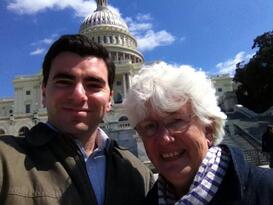In writing this history of the U.K., U.S., Canada, Australia, and New Zealand, Winston Churchill made clear that he subscribes to the “Great Man” theory of history.
“Here again we see the power of a great man to bring order out of ceaseless broils and command harmony and unity to be his servants, and how the lack of such men has to be paid for by the inestimable suffering of the many,” he writes of King Canute.
He also notes a theme of great men having weak sons.
It’s noteworthy because Churchill himself is the archetypal “Great Man” for all the people I’ve known who believe in Great Men (oddly, although I am not a huge Churchill fan, throughout my life people have assumed that I am a big admirer of his -- I’ve received a number of Churchill-themed gifts). His own view may have been shaped by the major role his ancestor, John Churchill, the first duke of Marlborough, played in British history. Perhaps another factor was his sense of his own place in history -- the (mostly apocryphal) “history will be kind to me, for I intend to write it.”
Churchill’s history is basically one of Great Men and military events. The Industrial Revolution, for example, passes almost without comment, while the Battle of Blenheim and the Vicksburg Campaign get extensive treatment.
Similarly, he doesn’t seem to dwell much on legal/constitutional/human rights developments, even though many today, especially in the U.S., would credit the British with our conceptions of liberty, starting with the Magna Carta.
Other notes from this book:
-- Churchill did credit St. Patrick for saving Christianity
-- Churchill argues that John losing Normandy was in the interest of England as it made the French rulers’ interests aligned with those of their English subjects. It “rid the island of a dangerous, costly distraction and entanglement, turned its thought and energies to its own affairs, and above all left a ruling class of alien origin with no interest henceforth that was not English or at least insular.“
-- A coincidence I hadn’t realized: 1453, same year as the fall of Constantinople, 20+ years after the death of Joan of Arc, the British lost the Battle of Castillon decisively, ending the 100 Years War and resulting in the British being swept off the continent, except for Calais.
-- Also, I hadn’t realized the significance of the Battle of Bosworth Field, in 1485: Henry Tudor defeated Richard III, ending the line of the Plantagenets, the War of the Roses, and the Middle Ages all at once. Last kings to die in battle/win throne in battle.
-- The title of “prime minister” originated as term of abuse for Robert Walpole, who rose to prominence under the german George I
-- Edmund Burke was “perhaps the greatest man that Ireland has produced”
-- He notes that free trade was given a major boost when Prime Minister Robert Peel reformed the Corn Laws to address the Irish famine in 1846
-- He notes that population growth in the US 1790-1820 had never been seen before in history
-- He calls Robert E. Lee “One of the noblest Americans who ever lived, and one of the greatest captains known to the annals of war.“
-- Benjamin Disraeli had an “oriental, almost mystical, approach to empire… An emphasis on imperial symbols, his belief in the importance of outward display"
“Here again we see the power of a great man to bring order out of ceaseless broils and command harmony and unity to be his servants, and how the lack of such men has to be paid for by the inestimable suffering of the many,” he writes of King Canute.
He also notes a theme of great men having weak sons.
It’s noteworthy because Churchill himself is the archetypal “Great Man” for all the people I’ve known who believe in Great Men (oddly, although I am not a huge Churchill fan, throughout my life people have assumed that I am a big admirer of his -- I’ve received a number of Churchill-themed gifts). His own view may have been shaped by the major role his ancestor, John Churchill, the first duke of Marlborough, played in British history. Perhaps another factor was his sense of his own place in history -- the (mostly apocryphal) “history will be kind to me, for I intend to write it.”
Churchill’s history is basically one of Great Men and military events. The Industrial Revolution, for example, passes almost without comment, while the Battle of Blenheim and the Vicksburg Campaign get extensive treatment.
Similarly, he doesn’t seem to dwell much on legal/constitutional/human rights developments, even though many today, especially in the U.S., would credit the British with our conceptions of liberty, starting with the Magna Carta.
Other notes from this book:
-- Churchill did credit St. Patrick for saving Christianity
-- Churchill argues that John losing Normandy was in the interest of England as it made the French rulers’ interests aligned with those of their English subjects. It “rid the island of a dangerous, costly distraction and entanglement, turned its thought and energies to its own affairs, and above all left a ruling class of alien origin with no interest henceforth that was not English or at least insular.“
-- A coincidence I hadn’t realized: 1453, same year as the fall of Constantinople, 20+ years after the death of Joan of Arc, the British lost the Battle of Castillon decisively, ending the 100 Years War and resulting in the British being swept off the continent, except for Calais.
-- Also, I hadn’t realized the significance of the Battle of Bosworth Field, in 1485: Henry Tudor defeated Richard III, ending the line of the Plantagenets, the War of the Roses, and the Middle Ages all at once. Last kings to die in battle/win throne in battle.
-- The title of “prime minister” originated as term of abuse for Robert Walpole, who rose to prominence under the german George I
-- Edmund Burke was “perhaps the greatest man that Ireland has produced”
-- He notes that free trade was given a major boost when Prime Minister Robert Peel reformed the Corn Laws to address the Irish famine in 1846
-- He notes that population growth in the US 1790-1820 had never been seen before in history
-- He calls Robert E. Lee “One of the noblest Americans who ever lived, and one of the greatest captains known to the annals of war.“
-- Benjamin Disraeli had an “oriental, almost mystical, approach to empire… An emphasis on imperial symbols, his belief in the importance of outward display"


